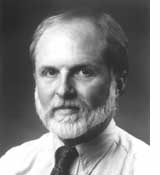 |

Friday Evening Lecture Series
 07/11/03 07/11/03
Making an Effort to Listen: Mechanical Amplification by Novel Molecular Motors in the Ear
A. James Hudspeth, F.M. Kirby Professor and Head, Laboratory of Sensory Neuroscience, The Rockefeller University
Introduction by Richard R. Fay, Professor of Psychology and Director of the Parmly Hearing Institute, Loyola University, Chicago
Lecture Abstract:
Uniquely among vertebrate sensory organs, the ear amplifies its inputs. An active process in auditory organs increases responsiveness to sound by over one-hundredfold and sharpens frequency selectivity. When this amplifier is excessively active, ears can even emit sound! Although changes in the length of outer hair cells are thought to mediate amplification in the mammalian cochlea, the auditory receptor organs of non-mammalian tetrapods, which lack electomotile hair cells, display essentially identical sensitivity, tuning, and auditory emissions. There must be additional mechanisms that constitute the active process in these animals, and perhaps in mammals as well.
When bathed in the ear’s normal internal solution, a mechanoreceptive hair bundle from the bullfrog’s internal ear undergoes spontaneous oscillations of ±20 nm. These movements, which involve energy expenditure by the bundle, may underlie the production of spontaneous auditory emissions. When its oscillations are entrained by stimuli as small as ±1 nm, the bundle exhibits power gain: a cellular energy source is required to counter the power dissipated by the bundle’s motion through viscous fluid. Two mechanisms account for active hair bundle motility: the exertion of myosin molecules that conduct adaptation of the mechanoelectrical transduction process, and work cone by the Ca2+ -dependent reclosure of transduction channels.
Albert James Hudspeth is Professor and Head of the Laboratory of Sensory Neuroscience at The Rockefeller University. Dr. Hudspeth received a B.A. from Harvard College’s Department of Biochemical Sciences in 1967, and both an M.A. in 1968 and Ph.D. in 1973 from the Harvard’s Department of Neurobiology. Dr. Hudspeth was awarded an M.D. from Harvard Medical School in 1974. He has been a member of the National Academy of Sciences since 1991, and the American Academy of Arts and Sciences since 2002. In addition, he holds memberships in several professional societies, including the Society for Neuroscience, the American Society for Cell Biology, and the American Association for the Advancement of Science. Dr. Hudspeth’s numerous honors include the Award of Merit from the Association for Research in Otolaryngology (2002), Award of Recognition from the Otological Society of Japan (2001), and the Hugh Knowles Prize from Northwestern University (2000). He currently serves on the International Advisory Board at the University College London Centre for Auditory Research, United Kingdom; as well as the Board of Directors of The Burroughs Wellcome Fund; External Faculty of the Instituto de Ciencias Biomedicas, Chile; and the Selection Panel for McKnight Scholars Award of the McKnight Endowment Fund for Neuroscience. Since 1993, Dr. Hudspeth has been an Investigator at Howard Hughes Medical Institute, and, since 1998, the Director of the Kirby Center for Sensory Neuroscience at The Rockefeller University. He has over seventy-five published research papers, several book chapters, and three books in print. Dr. Hudspeth currently serves as an editorial panelist for Neuron, a publication he co-founded, and as an advisory editor for The Journal of General Physiology, as well as ad hoc reviewer for numerous publications including Hearing Research, Proceedings of the National Academy of Sciences of the United States of America, Science, and Nature.
Richard R. Fay began his association with the MBL in 1989 when he completed the Neural Systems and Behavior course. Since 1993 he has been an MBL summer scientist and was a lecturer at the Boston University Marine Program from 1994 to 1996. Dr. Fay received graduate degrees in experimental psychology and sensory physiology from Connecticut College (M.A., 1968) and Princeton University (Ph.D., 1970). His research is on the neural mechanisms of perception, sensory neuroscience, evolution and hearing. He has received numerous honors including the Loyola University Faculty Scholar (2000-2003) and holds memberships in the Acoustical Society of America, the Society for Neuroscience and several others. Dr. Fay has authored over 100 publications and 24 books, as well as 160 abstracts, presentations, and invited lectures. He is presently Professor of Psychology, Loyola University, Chicago; and Director of the Parmly Hearing Institute.
|